Related Research Articles

Jack McDevitt is an American science fiction author whose novels frequently deal with attempts to make contact with alien races, and with archaeology or xenoarchaeology. Most of his books follow either superluminal pilot Priscilla "Hutch" Hutchins or galactic relic hunters Alex Benedict and Chase Kolpath. McDevitt has received numerous nominations for Hugo, Nebula, and John W. Campbell awards. Seeker won the 2006 Nebula Award for Best Novel.

Gene Rodman Wolfe was an American science fiction and fantasy writer. He was noted for his dense, allusive prose as well as the strong influence of his Catholic faith. He was a prolific short story writer and novelist, and won many literary awards. Wolfe has been called "the Melville of science fiction", and was honored as a Grand Master by the Science Fiction and Fantasy Writers of America.

Gardner Raymond Dozois was an American science fiction author and editor. He was the founding editor of The Year's Best Science Fiction anthologies (1984–2018) and was editor of Asimov's Science Fiction magazine (1986–2004), garnering multiple Hugo and Locus Awards for those works almost every year. He also won the Nebula Award for Best Short Story twice. He was inducted to the Science Fiction Hall of Fame on June 25, 2011.

Michael Swanwick is an American fantasy and science fiction author who began publishing in the early 1980s.
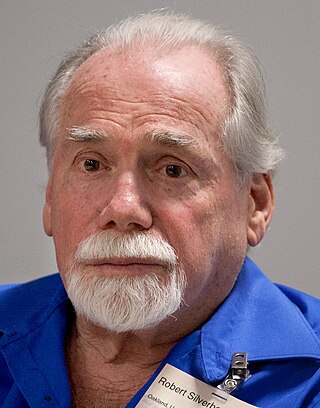
Robert Silverberg is an American author and editor, best known for writing science fiction. He is a multiple winner of both Hugo and Nebula Awards, a member of the Science Fiction and Fantasy Hall of Fame, and a Grand Master of SF. He has attended every Hugo Award ceremony since the inaugural event in 1953.

Asimov's Science Fiction is an American science fiction magazine which publishes science fiction and fantasy named after science fiction author Isaac Asimov. It is currently published by Penny Publications. From January 2017, the publication frequency is bimonthly.
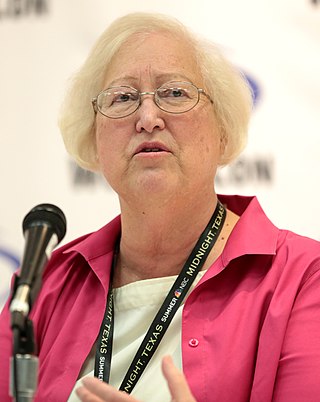
Constance Elaine Trimmer Willis, commonly known as Connie Willis, is an American science fiction and fantasy writer. She has won eleven Hugo Awards and seven Nebula Awards for particular works—more major SF awards than any other writer—most recently the "Best Novel" Hugo and Nebula Awards for Blackout/All Clear (2010). She was inducted by the Science Fiction Hall of Fame in 2009 and the Science Fiction Writers of America named her its 28th SFWA Grand Master in 2011.
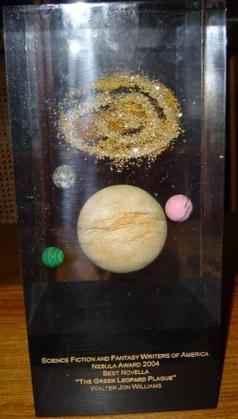
The Nebula Award for Best Short Story is a literary award assigned each year by Science Fiction and Fantasy Writers of America (SFWA) for science fiction or fantasy short stories. A work of fiction is defined by the organization as a short story if it is less than 7,500 words; awards are also given out for longer works in the categories of novel, novella, and novelette. To be eligible for Nebula Award consideration a short story must be published in English in the United States. Works published in English elsewhere in the world are also eligible provided they are released on either a website or in an electronic edition. The Nebula Award for Best Short Story has been awarded annually since 1966. The award has been described as one of "the most important of the American science fiction awards" and "the science-fiction and fantasy equivalent" of the Emmy Awards.

Martha Wells is an American writer of speculative fiction. She has published a number of fantasy novels, young adult novels, media tie-ins, short stories, and nonfiction essays on fantasy and science fiction subjects. Her novels have been translated into twelve languages. Wells has won four Hugo Awards, two Nebula Awards and three Locus Awards for her science fiction series The Murderbot Diaries. She is also known for her fantasy series Ile-Rien and The Books of the Raksura. Wells is praised for the complex, realistically detailed societies she creates; this is often credited to her academic background in anthropology.
"The Dog Said Bow-Wow" is a science fiction short story by American writer Michael Swanwick, published in 2001. It won the 2002 Hugo Award for Best Short Story and was nominated for the 2002 Nebula Award for Best Short Story. The Dog Said Bow-Wow is the title story of his 2007 short story collection, published by Tachyon Publications, and was reprinted in the same year in Rewired: The Post-Cyberpunk Anthology.

Aliette de Bodard is a French-American speculative fiction writer.

Terry Carr's Best Science Fiction of the Year is an anthology of science fiction short stories edited by Terry Carr, the fourteenth volume in a series of sixteen. It was first published in paperback by Tor Books in July 1985, and in hardcover and trade paperback by Gollancz in October of the same year, under the alternate title Best SF of the Year #14.
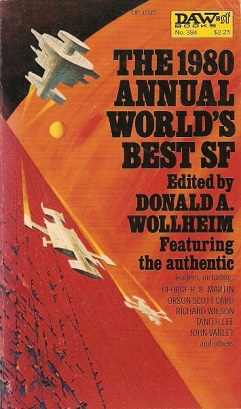
The 1980 Annual World's Best SF is an anthology of science fiction short stories edited by Donald A. Wollheim and Arthur W. Saha, the ninth volume in a series of nineteen. It was first published in paperback by DAW Books in May 1980, followed by a hardcover edition issued in September of the same year by the same publisher as a selection of the Science Fiction Book Club. For the hardcover edition the original cover art of Jack Gaughan was replaced by a new cover painting by Gary Viskupik. The paperback edition was later reissued by DAW under the variant title Wollheim's World's Best SF: Series Nine.

The 1986 Annual World's Best SF is an anthology of science fiction short stories edited by Donald A. Wollheim and Arthur W. Saha, the fourteenth volume in a series of nineteen. It was first published in paperback by DAW Books in June 1986, followed by a hardcover edition issued in August of the same year by the same publisher as a selection of the Science Fiction Book Club. For the hardcover edition the original cover art by Vincent Di Fate was replaced by a new cover painting by Ron Walotsky.
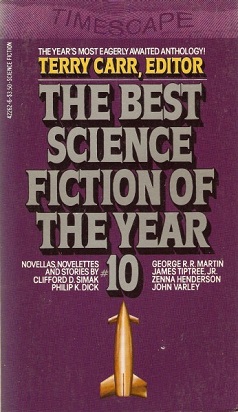
The Best Science Fiction of the Year #10 is an anthology of science fiction short stories edited by Terry Carr, the tenth volume in a series of sixteen. It was first published in paperback by Pocket Books in July 1981, and in trade paperback and hardcover and trade paperback by Gollancz in the same year.

The Best Science Fiction of the Year #11 is an anthology of science fiction short stories edited by Terry Carr, the eleventh volume in a series of sixteen. It was first published in paperback by Pocket Books in July 1982, and in hardcover by Gollancz in the same year.
Rachel Swirsky is an American literary, speculative fiction and fantasy writer, poet, and editor living in Oregon. She was the founding editor of the PodCastle podcast and served as editor from 2008 to 2010. She served as vice president of the Science Fiction and Fantasy Writers of America in 2013.

Full Spectrum is a series of five anthologies of fantasy and science fiction short stories published between 1988 and 1995 by Bantam Spectra. The first anthology was edited by Lou Aronica and Shawna McCarthy; the second by Aronica, McCarthy, Amy Stout, and Pat LoBrutto; the third and fourth by Aronica, Stout, and Betsy Mitchell; and the fifth by Jennifer Hershey, Tom Dupree, and Janna Silverstein.

Nebula Award Stories Sixteen is an anthology of award winning science fiction short works edited by Jerry Pournelle and John F. Carr. It was first published in hardcover by Holt, Rinehart and Winston in August 1982; a paperback edition was issued by Bantam Books in September 1983. British editions were issued by W. H. Allen (hardcover) and Star (paperback) in 1983; the latter under the variant title Nebula Winners Sixteen.
Sarah Pinsker is an American science fiction and fantasy author. A nine-time finalist for the Nebula Award, Pinsker's debut novel A Song for a New Day won the 2019 Nebula for Best Novel while her story Our Lady of the Open Road won 2016 award for Best Novelette. Her novelette "Two Truths and a Lie" received both the Nebula Award and the Hugo Award. Her fiction has also won the Philip K. Dick Award, the Theodore Sturgeon Memorial Award and been a finalist for the Hugo, World Fantasy, and Tiptree Awards.
References
- 1 2 "1997 Hugo Awards". The Hugo Awards. Retrieved 9 February 2023.
- 1 2 "1998 Nebula Awards". Nebula Awards. Retrieved 9 February 2023.
- ↑ Lovegrove, James. "Dawn of the Dead". Financial Times. Retrieved 10 February 2023.
- ↑ "Interview with Michael Swanwick". Big Echo. Retrieved 10 February 2023.
- ↑ Hamdan, Shahizah Ismail; Omar, Noritah (2010). "Sense and Intention: Reading Science Fiction Worlds and Characters". 3L: The Southeast Asian Journal of English Language Studies. 16 (2): 1–18.
- ↑ Theiss, Derek (Summer 2022). "Sport SF and the Male Body: Estranged (Non-)Consent in Swanwick's "The Dead"". SFRA Review. 52 (3): 153–161. Retrieved 10 February 2023.
- ↑ "Locus Awards 1997". Science Fiction Awards Database. Retrieved 9 February 2023.
- ↑ "1996 Long List". Otherwise Award. Retrieved 9 February 2023.